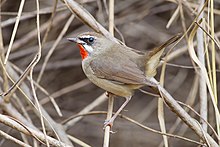Siberian rubythroat
| Siberian rubythroat | |
|---|---|

| |
| Luscinia calliope male | |
| Scientific classification | |
| Kingdom: | |
| Phylum: | |
| Class: | |
| Order: | |
| Family: | |
| Genus: | |
| Species: | L. calliope
|
| Binomial name | |
| Luscinia calliope (Pallas, 1776)
| |

| |
Summer Winter[2] | |
The Siberian rubythroat (Luscinia calliope) is a small passerine bird that was formerly classed as a member of the thrush family, Turdidae, but is now more generally considered to be an Old World flycatcher of the family Muscicapidae.[3] The Siberian rubythroat and similar small European species are often called chats.
It is a migratory insectivorous species breeding in mixed coniferous forests with undergrowth in Siberia. It nests near the ground. It winters in Thailand, India and Indonesia. It is an extremely rare vagrant to Western Europe, having occurred on a very few occasions as far west as Britain. It is also an extremely rare vagrant to the Aleutian Islands, most notably on Attu Island.[4]
The Siberian rubythroat is slightly larger than the European robin. It is plain brown above except for the distinctive black tail with red side patches. It has a strong white supercilium.
The male has a red throat edged with a narrow black and then a broad white border. It has a strong white supercilium. Females lack the brightly coloured throat and borders.
The male has a song similar to a harder version of the garden warbler.
Notes
- ^ "Luscinia calliope". IUCN Red List of Threatened Species. 2012. IUCN: e.T22709701A39749592. 2012. Retrieved 31 March 2016.
{{cite journal}}: Unknown parameter|authors=ignored (help) - ^ Urs N. Glutz von Blotzheim, K. M. Bauer (1988). Handbuch der Vögel Mitteleuropas. ISBN 3-923527-00-4.
- ^ Lekagul, Boonsong; Round, Philip D.; Wongkalisn, Mongkol; Komolphalin, Kamol; King, Ben. "A Guide to the Birds of Thailand".
{{cite web}}: Missing or empty|url=(help) - ^ "The British List". British Ornithologists' Union. Retrieved 24 September 2010.
External links
 Media related to Luscinia calliope at Wikimedia Commons
Media related to Luscinia calliope at Wikimedia Commons Data related to Luscinia calliope at Wikispecies
Data related to Luscinia calliope at Wikispecies- Luscinia calliope in Field Guide: Birds of the World on Flickr
- "Luscinia calliope". Avibase.


